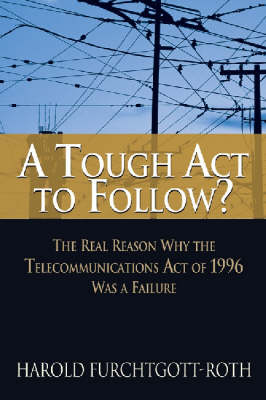
A Tough Act to Follow?
The Real Reason Why the Telecommunications Act of 1996 Was a Failure
Seiten
2005
AEI Press (Verlag)
978-0-8447-4235-9 (ISBN)
AEI Press (Verlag)
978-0-8447-4235-9 (ISBN)
- Keine Verlagsinformationen verfügbar
- Artikel merken
The author, who served as one of the five commissioners of the Federal Communications Commission for several years, explains why this and other government agencies that are not set up with separation of powers in mind end up undermining the rule of law.
The telecommunications bubble burst in 2001 was almost certainly the largest financial collapse of any one sector in American history. Many blamed the collapse on the Telecommunications Act of 1996 - which was supposed to allow practically any company to offer communications and other services in a field where regulators had long forbidden competition. But if the law were so bad, why did the telecommunications stock market skyrocket for the first four years after its passage? "In A Tough Act to Follow?", Harold Furchtgott-Roth, who from 1997 to 2001 served on the Federal Communications Commission (the agency with primary responsibility for implementing the act), provides a different explanation: The law itself was never properly implemented. One of the few economists to have served on a federal regulatory commission, he contends that the FCC likely contributed to both the depth of the collapse and the slowness of the recovery of the communications sector.
A forceful critic of the agency's over regulation of communications and broadcasting markets and a frequent dissenter from its decisions while he was a commissioner, Furchtgott-Roth explains that the act preserved the FCC's multiple and conflicting responsibilities, including the writing of rules to implement the act, the enforcement of those rules, and the adjudication of the disputes that arose under them. Furchtgott-Roth presents the act as a case study in how badly government can work by describing the consequences of an agency's failure to operate clearly under a clear rule of law. The example given is the FCC, but the same failure may be observed to varying degrees at other government agencies. The consequences of bad government, and the remedies he offers for it, are likely to be similar.
The telecommunications bubble burst in 2001 was almost certainly the largest financial collapse of any one sector in American history. Many blamed the collapse on the Telecommunications Act of 1996 - which was supposed to allow practically any company to offer communications and other services in a field where regulators had long forbidden competition. But if the law were so bad, why did the telecommunications stock market skyrocket for the first four years after its passage? "In A Tough Act to Follow?", Harold Furchtgott-Roth, who from 1997 to 2001 served on the Federal Communications Commission (the agency with primary responsibility for implementing the act), provides a different explanation: The law itself was never properly implemented. One of the few economists to have served on a federal regulatory commission, he contends that the FCC likely contributed to both the depth of the collapse and the slowness of the recovery of the communications sector.
A forceful critic of the agency's over regulation of communications and broadcasting markets and a frequent dissenter from its decisions while he was a commissioner, Furchtgott-Roth explains that the act preserved the FCC's multiple and conflicting responsibilities, including the writing of rules to implement the act, the enforcement of those rules, and the adjudication of the disputes that arose under them. Furchtgott-Roth presents the act as a case study in how badly government can work by describing the consequences of an agency's failure to operate clearly under a clear rule of law. The example given is the FCC, but the same failure may be observed to varying degrees at other government agencies. The consequences of bad government, and the remedies he offers for it, are likely to be similar.
Harold Furchtgott-Roth, a former commissioner of the Federal Communications Commission, is president of Furchtgott-Roth Economic Enterprises in Washington, D.C. Before his appointment to the FCC, he was a chief economist for the House Committee on Commerce and a principal staff member behind the Telecommunications Act of 1996. Mr. Furchtgott-Roth has coauthored several books, most recently (with Robert W. Crandall) Cable TV: Regulation or Competition (Brookings Institution Press, 1996).
| Erscheint lt. Verlag | 21.12.2005 |
|---|---|
| Verlagsort | Washington DC |
| Sprache | englisch |
| Maße | 159 x 222 mm |
| Gewicht | 308 g |
| Themenwelt | Recht / Steuern ► EU / Internationales Recht |
| Recht / Steuern ► Privatrecht / Bürgerliches Recht ► IT-Recht | |
| Sozialwissenschaften ► Kommunikation / Medien ► Journalistik | |
| Wirtschaft | |
| ISBN-10 | 0-8447-4235-X / 084474235X |
| ISBN-13 | 978-0-8447-4235-9 / 9780844742359 |
| Zustand | Neuware |
| Haben Sie eine Frage zum Produkt? |
Mehr entdecken
aus dem Bereich
aus dem Bereich
Telekommunikations- und Multimediarecht
Buch | Softcover (2024)
dtv Verlagsgesellschaft
CHF 38,95
Datenschutz-Grundverordnung Bundesdatenschutzgesetz
Buch | Hardcover (2024)
C.F. Müller (Verlag)
CHF 279,95


